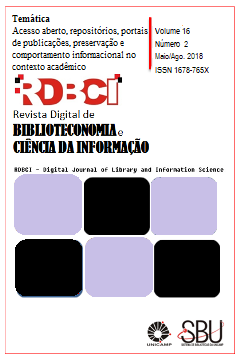Abstract
This research is descriptive and discusses the development of Marketing from a historical perspective and its convergence with the paradigms of Information Science, known as physical, cognitive and social paradigms. Firstly, within the physical paradigm, the birth of both areas of knowledge is related, which excludes the active role of the cognizance subject in all the informative and communicative process. From a cognitive view, the proximity of the areas is analyzed, from interactions and the user’s necessity of information systems, where both the systems were not concerned with understanding the user in order to adjust the service to him. The last stage of marketing resembles that of the last paradigm of Information Science, whose objective is to integrate the physical and cognitive approach, considering the social make-up of the individual to construct an ideal model which benefits all those involved in the process. It is the social paradigm advocated by Shera. The study concludes by highlighting the harmony between Marketing and Information Science from which both
areas benefit not only theoretically, but it also benefits the theories and practices of Administration and Library Science, from the common objectives to those fields of knowledge: the fulfillment of the informational necessities of the users/clients.
References
AMARAL, Sueli Angélica. Marketing da informação: abordagem inovadora para entender o mercado e o negócio da informação Ci. Inf., Brasília, DF, v. 40 n. 1, p.85-98, jan./abr., 2011. Disponível em: < http://revista.ibict.br/ciinf/article/view/1327/1506. Acesso em: 8 dez. 2017.
ANDREASEN, Alan R. Avanço do marketing para biblioteca do futuro. In: SILVEIRA, Amélia (Org.) Marketing em bibliotecas e serviço de informação: textos selecionados. Brasília: IBICT, 1987. p. 37-64.
BONIFACIO, Everton Lopes. Ciência da informação e marketing: uma interdisciplinaridade possível. Ciência da informação, Brasília, DF, v. 44, n. 3, p. 366-380, set./dez. 2015. Disponível em: http://revista.ibict.br/ciinf/article/view/1791. Acesso em: 10 dez. 2017.
CAPURRO, Rafael. Epistemologia e ciência da informação. In: ENCONTRO NACIONAL DE PESQUISA EM CIÊNCIA DA INFORMAÇÃO, 5., 2003, Belo Horizonte, Anais... Belo Horizonte: Escola de Ciência da informação da UFMG, 2003. p. [1-18]. 1 CD-ROM.
COBRA, Marcos. Marketing básico: uma abordagem brasileira. 4. ed. São Paulo: Atlas, 1997.
DANTAS, Edmundo Brandão. A informação como insumo da prática do marketing na gestão do conhecimento do cliente. Inf. & Soc.: Est., João Pessoa, v. 16, n. 1, p. 35-47 já./jun. 2006. Disponível em: http://www.ies.ufpb.br/ojs/index.php/ies/article/view/440/1492. Acesso em: 10 dez. 2017.
DRUCKER, Peter Ferdinand. Administração de organizações sem fins lucrativos: princípios e práticas. 4. ed. São Paulo: Pioneira, 1997. 166 p.
KOTLER, Philip. Marketing para organizações que não visam o lucro. São Paulo: Atlas. 1978. 430 p.
HEWIS, Elizabeth. Information need and use studies. Annual Review of Information Science and Technology (ARIST), v. 25, p. 145-172, 1990.
KOTLER, Philip. Marketing para organizações que não visam o lucro. São Paulo: Atlas. 1978. 430 p.
KOTLER, Philip; KELLER, Kevin Lane. Administração de marketing. 12 ed. São Paulo: Pearson Prentice Hall, 2006. 750 p.
KOTLER, Philip; LEE, Nancy. Marketing no setor público: um guia para um desempenho mais eficaz. Porto Alegre: Bookman, 2008. 350 p.
KUEHL, Philip. G. Marketing viewpoints for user need studies. In: TAYLOR, R. S. (Ed.) Economics of information dissemination: a symposium. Syracuse: Syracuse University: 1973: 49-67 apud Sueli Angélica do Amaral. Marketing: abordagens em unidades de informação. Brasília: Thesaurus, 1998. 245p.
LE COADIC, Yves, F. Ciência da informação. Brasília: Briquet de Lemos Livros, 1994. p. 82.
LEITÃO, Paulo Jorge O. Uma biblioteca nas redes sociais: o caso da Biblioteca de Arte da Fundação Calouste Gulbenkian no FLICKR. In: CONGRESSO NACIONAL DE BIBLIOTECÁRIOS, ARQUIVISTAS E DOCUMENTALISTAS, 10., Guimarães. Actas. Lisboa: BAD, 2010. Disponível em: http://www.bad.pt/publicacoes/index.php/congressosbad/article/view/189. Acesso em: maio 2017.
LEVITT, Theodore. A imaginação de marketing. 2. ed. São Paulo: Atlas, 2007.
LIMEIRA, Tânia Maria Vidigal. Fundamentos de Marketing. In: DIAS, Sérgio Roberto. (Coord.). Gestão de marketing. São Paulo: Saraiva, 2003, cap. 1.
MATHEUS, Renato Fabiano. Rafael Capurro e a filosofia da informação: abordagens, conceitos e metodologias de pesquisa para a Ciência da informação. Perspectiva Ciência da informação, Belo Horizonte, v. 10, n. 2, p. 140-165, jul./dez. 2005.
MOREIRA, Roberto Resende. O uso da reclamação com meio de coleta de informações nas ouvidorias públicas. 2006. 190f. Dissertação (Mestrado em Ciência da informação) - Faculdade de Economia, Administração, Contabilidade e Ciência da informação e Documentação (FACED), Universidade de Brasília, Brasília, 2006.
RICHERS, Raimar. Marketing: uma visão brasileira. 3. ed. São Paulo: RCA, 2000.
SANTOS, Tatiani et al. O desenvolvimento do marketing: uma perspectiva histórica. Revista de Gestão USP, São Paulo, v. 16, n. 1, p. 89-102, jan./mar. 2009.
SILVEIRA, Amélia. Marketing em bibliotecas universitárias. Florianópolis: UFSC, 1992. 161p.
SO, Denise Rodrigues. A segmentação de clientes em bibliotecas. 2007. 189 f. Dissertação (Mestrado em Ciência da informação) – Escola de Comunicação e Arte, Universidade de São Paulo (USP), São Paulo. 2007.

RDBCI: Revista Digital de Biblitoeconomia e Ciência da Informação / Digital Journal of Library and Information Science uses the Creative Commons (CC) license, thus preserving the integrity of articles in an open access environment, in which:
- This publication reserves the right to modify the original, regarding norms, spelling and grammar, in order to maintain the standards of the language, still respecting author writing style;
- The original documents will not be returned to the authors;
- Published works become Revista Digital de Biblitoeconomia e Ciência da Informação / Digital Journal of Library and Information Science's property, their second partial or full print being subject to expressed authorization by RDBCI's editor;
- The original source of publicaton must be provided at all times;
- The authors are solely responsible fo the views expressed within the document.






